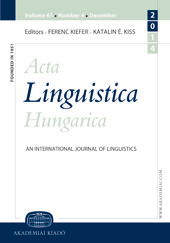Degemination in Hungarian: Phonology or phonetics?
Degemination in Hungarian: Phonology or phonetics?
Author(s): Péter Siptár, Tekla Etelka GrácziSubject(s): Language studies, Phonetics / Phonology, Finno-Ugrian studies
Published by: Akadémiai Kiadó
Keywords: true geminates; fake geminates; degemination; phonetic compression; autosegmental representation;
Summary/Abstract: It is traditionally held with respect to Hungarian degemination that geminates do not occur in this language word initially or flanked by another consonant on either side. The occurrence of geminates, true and fake ones alike, is said to be impossible except intervocalically or utterance finally (if preceded by a vowel and followed by a pause). However, this traditional view is oversimplified. Siptár (2000) proposed to amend it by positing three different degemination rules, applying at word level, postlexically, and in the phonetic implementation module, respectively. Furthermore, he reinterpreted several cases that traditionally had been analysed as degemination as lack of gemination. In view of the recent literature, however, the hypothesis can be advanced that the whole issue should be seen as a matter of phonetic duration rather than that of phonological quantity. In particular, the hypothesis is that the familiar degemination effects are not specific to geminates: they are due to phonetic compression of CCC clusters. The paper presents and discusses that hypothesis and cites some results of a small-scale phonetic experiment designed to confirm (or disconfirm) it by empirical data. Six short texts involving all types of geminates and control sequences with both short and long consonants were created. Six consonants (two fricatives, three plosives, and a nasal) were used in the test (and control) sequences. The duration of the target consonant and that of the consonant cluster including it were measured in each case. The results partially support the hypothesis but they also raise some further questions.
Journal: Acta Linguistica Hungarica (Since 2017 Acta Linguistica Academica)
- Issue Year: 61/2014
- Issue No: 4
- Page Range: 443-471
- Page Count: 29
- Language: English

